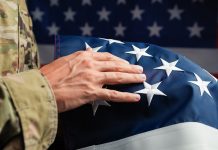At certain moments we lock onto the details, ever after keeping them near the surface of memory.
On November 22, 1963, I was an Army wife, living in Lawton, Oklahoma, about 200 miles north of Dallas, where President John F. Kennedy was touring.
As the news that Kennedy had been shot spilled out of the radio, I remember going to my six-month old son and holding him close before carrying him downstairs to the apartment of my neighbor Janet, a sergeant’s wife from North Carolina, who was teaching me to quilt. It seemed important to not be alone.
Together we watched the story unfold on Janet’s TV, Walter Cronkite’s stricken face as he reported that the president was dead.
In that part of the country the news was not universally lamented. This was conservative territory, and many feared that a Kennedy dynasty was in the making: After JFK, his brother Robert would be primed to take over as president, and after him, young brother Ted. (No such concerns about the family’s smart and capable women — the country was decades from seriously considering the idea of a woman president.)
In Dallas, a classroom of elementary school children reportedly cheered at the news of the president’s death.
Kennedy’s assassination deeply affected my view of this country. I had grown up in New York City and, in the way that New Yorkers can be, was provincial in my beliefs — that diversity was normal and good, that people could disagree and still get along (even if we yelled about it), that our country was, essentially, safe. The Kennedy presidency had been vital and glamorous and full of promise.
That November afternoon, I remember looking at my green-eyed, blonde-haired baby and wondering what I might say to him someday about the year into which he was born. Over the years I tried, and was gratified to see my son develop an abiding interest in American history. He votes, he’s informed, he cares about what happens to this country. What else can I tell him, except to apologize for a generation that let the promise of the early 1960s slip through our hands into unwinnable wars and a politics of cynicism.
So I find myself turning not to words but to music, specifically to Don McLean’s eight-and-a-half minute opus, “American Pie,” also known as “The Day the Music Died.”
McLean has said that his song grieves the death of rock ‘n’ roll singer Buddy Holly in a 1959 plane crash, but his lyrics are crowded with imagery that evokes much more: the decade of political and social upheaval that was the 1960s. Ultimately McLean sings of a “generation lost in space with no time left to start again.”
November 22, 1963, was the day the music of my native American innocence and optimism began to die.
“So bye, bye Miss American Pie.”
On November 22, the Concordia University Center for Public Policy plans a commemoration of the 50th anniversary of Kennedy’s death at the Newport Beach Public Library (1000 Avocado Avenue) featuring Tim Naftali, a Kennedy biographer and archivist.
Keith Curry, Newport Beach mayor and the director of the Center, says, “No matter your political views, I encourage you to come out and revisit a time when Americans were challenged and inspired by their President. If this was before your time, you will want to learn about an era when leadership counted and made the difference between war and peace.”
Reception at 6 p.m., presentation at 7 p.m. Tickets available at cui.edu/cpp, or by calling Keith Curry at (949) 214-3200.
The writer can be reached at jeanardell@me.com



